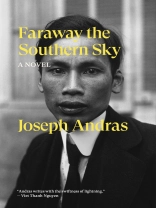Fleeing persecution in Indochina, the young Ho Chi Minh arrived in Paris as World War I was sputtering to a close. A painfully shy twentysomething, he joined the shadowy figures of the demimonde, the radicals, poor artists, prostitutes, the luckless, and rebellious.
Six years later, he boarded a train bound for the young Soviet Union as the fiery, passionate leader of the Vietnamese independence movement and a founder of the French Communist Party. He had lived under various pseudonyms in a succession of seedy apartments. There had been arrests and beatings, jobs in restaurants and photo shops, revolutionary writing in the Biblioth�que nationale, and meetings with Chaplin and Colette, all while being dogged by French spies-much of what we know about the young man’s Paris years is thanks to that surveillance.
Searching for traces of the past in the streets of today, Joseph Andras hears echoes of other angry histories, from terror attacks to tent encampments to the protests of the Gilets jaunes. This intensely lyrical, genre-bending book is a meditation on what could be called the grandeur of the poor, the free, the outcast, and the rebellious-people who might not find a place in history books but without whom history could not be written.
Praise for Tomorrow They Won’t Dare to Murder Us
– ‘Electrifying … insists on plumbing the thorniest details of history’s scandal, suggesting-convincingly-that certain truths are best revealed in fiction.’ Kaiama L. Glover, New York Times
– ‘A very beautiful book to reflect on: when a ‘traitor’ preserves our ‘dignity.” �ric Vuillard, author of The War of the Poor and The Order of the Day
– ‘An austerely compelling account … Andras’s bleak account is leavened by passages of vibrant lyricism.’ Laura Garmeson, Times Literary Supplement
– ‘Andras delivers a brisk, angry slap of outraged idealism . Powerful.’ Boyd Tonkin, Spectator
– ‘Tightly coiled … Andras is fastidious about adhering to the known facts. His restraint is commendable.’ Literary Review
Mengenai Pengarang
Joseph Andras is the author of the novels De nos fr�res bless�s and Kanaky. Awarded the Prix Goncourt for De nos fr�res bless�s (Tomorrow They Won’t Dare to Murder Us), he refused the prize, explaining his belief that ‘competition and rivalry were foreign to writing and creation’.












